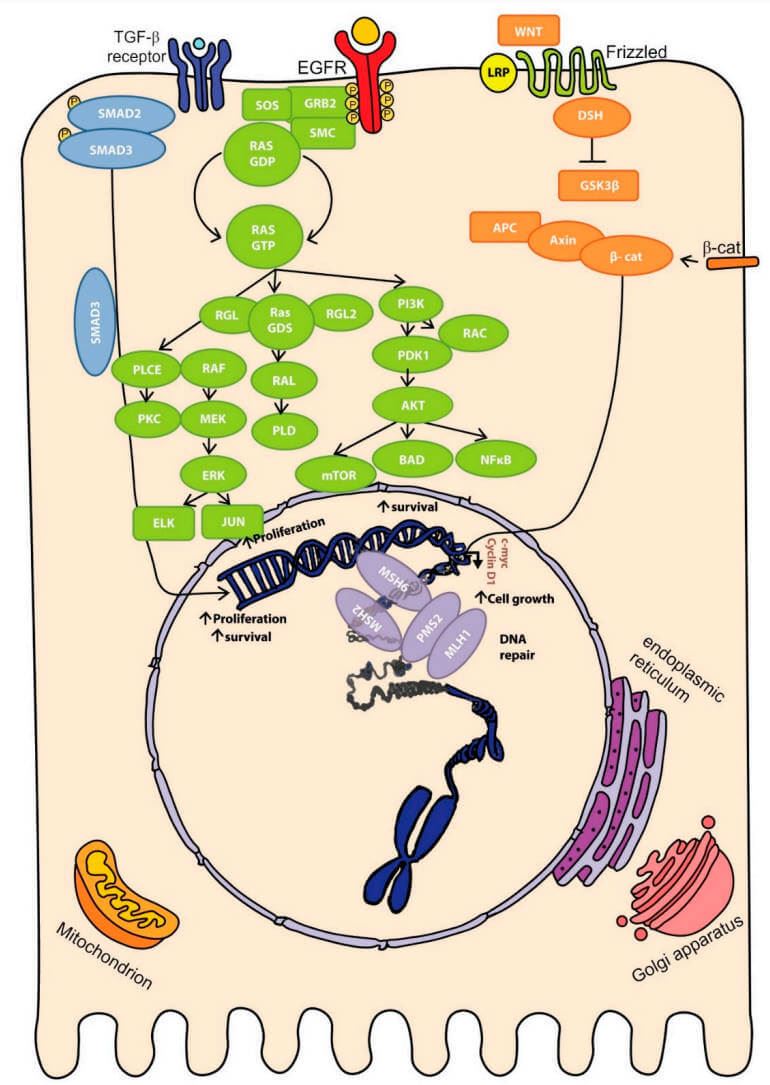Colorectal cancer (CRC), also known as colon cancer and bowel cancer, is cancer that develops from the colon or rectum (part of the large intestine). Colorectal cancer may be benign or malignant. According to the World Health Organization and CDC, it is the second most common cancer worldwide, after lung cancer. The mortality of colorectal cancer has been dropping for more than 20 years due to the improvements in screening techniques and treatments. Signs and symptoms may include weight loss, tiredness, bowel movements changing and blood in the stool. Creative Biolabs provides a number of IVD antibody development services for colorectal cancer diagnosis.
Screening is effective in preventing and reducing deaths of colorectal cancer. Colorectal cancer is diagnosed by sigmoidoscopy or colonoscopy, followed by medical imaging to determine if the disease has spread. If a large polyp or tumor is found, a biopsy can be performed to check if it is cancerous. Treatments for colorectal cancer include radiotherapy, chemotherapy, surgery, targeted therapies and some combination. Cancers confined within the colon wall can be surgically cured, while widespread cancers are often incurable and the goal of management is to improve the quality of life and symptoms.
 Fig.1 Molecular pathways involved in colorectal carcinogenesis.1
Fig.1 Molecular pathways involved in colorectal carcinogenesis.1
The stages of colorectal cancer
The stage of colorectal cancer means the degree of it. Based on the diagnosis of colon cancer, the doctor will determine the stage, which helps select the most appropriate treatment. The stages of colon cancer are:
- Stage 0 (carcinoma in situ): also known as Duke A stage. It is still within the mucosa (inner layer) of the colon or rectum.
- Stage I: also known as Duke B stage. Cancer has grown through the inner layer of the colon and invaded the muscle.
- Stage II: also known as Duke C stage. Cancer has grown through or into the wall of the colon or rectum and has invaded the nearby lymph nodes.
- Stage III: also known as Duke D stage. The nearby lymph nodes have been invaded by cancer, but other parts of the body have not yet been affected.
- Stage IV: also known as Duke E stage. Cancer has metastasized to other organs.
Symptoms
The signs and symptoms of colorectal cancer depend on the location of the tumor in the intestine and whether it has metastasized. Signs and symptoms of colorectal cancer may include:
- Bowel habits change: including diarrhea or constipation or a change in the consistency of your stool, which lasts longer than a month
- A feeling that the bowel does not empty properly after a bowel movement
- Blood in feces: rectal bleeding or blood in stool
- Decrease in stool caliber (thickness)
- Nausea or vomiting
- Loss of appetite or unexplained loss of weight
- Pains in the abdomen
- Persistent abdominal discomfort, such as cramps, gas or pain
- Weakness or fatigue
Risk factors
Factors that can increase the risk of colorectal cancer include older age, male gender, alcohol, smoking, obesity, high intake of fat, red meat, processed meats, and a lack of physical exercise.
The discovery of disease-specific biomarkers and the generation of high-quality antibodies are of great importance for the development of IVD immunoassays and kits. To assist customers in their IVD project development, Creative Biolabs offers a suite of IVD antibody development services against potential diagnostic biomarkers of colorectal cancer. We also offer IVD antibodies development services for many other diseases. If you are interested in our service, please feel free to contact us for more information and a detailed quote.
Our services target the following biomarkers for colorectal cancer diagnosis:
Reference
- Mármol, Inés, et al. "Colorectal carcinoma: a general overview and future perspectives in colorectal cancer." International journal of molecular sciences 18.1 (2017): 197. Distributed under Open Access license CC BY 4.0, without modification.
For Research Use Only.